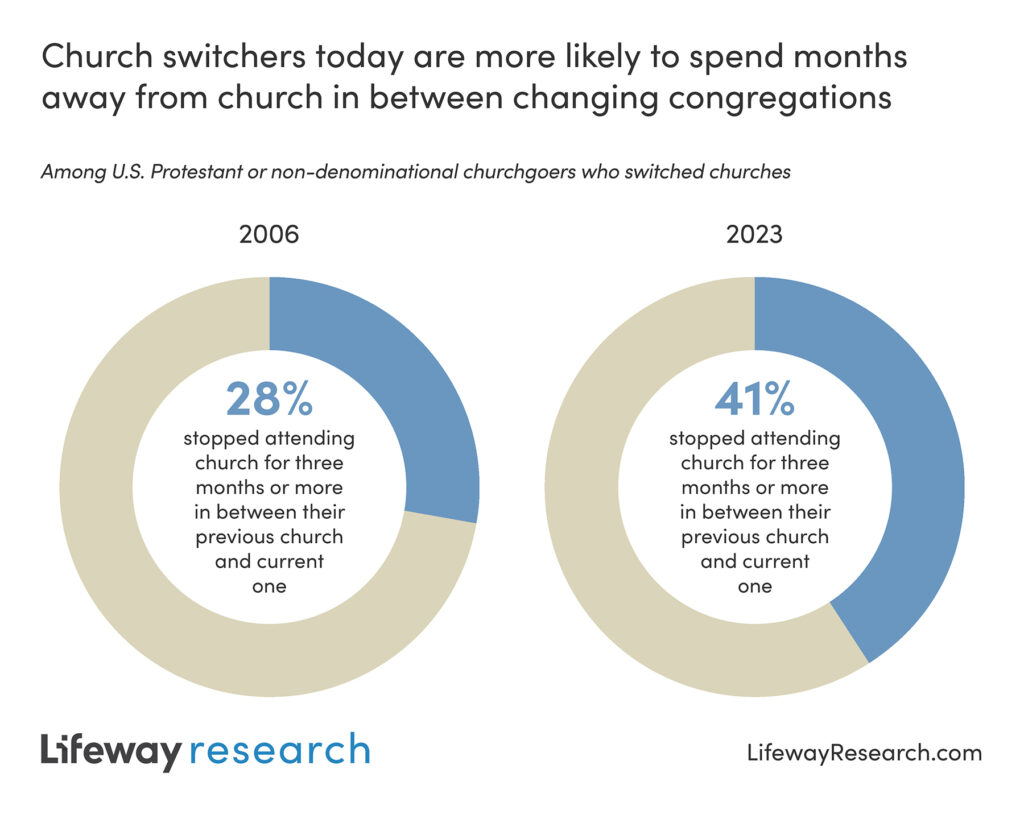Most adult churchgoers in the United States don’t frequently switch churches. But if they make a congregational change, it’s likely they made a residential change first. And those who switch have high expectations for their new congregation.
Data from a recent Lifeway Research study of American Protestant adults who attend church at least twice a month and have attended more than one church as an adult provide pastors and church leaders with insights into the ins and outs of who’s going in or out of their church doors.
During the screening process, researchers found nearly half (47%) of Protestant churchgoers who attend church at least twice a month have only attended one church as adults. Among those who have regularly attended multiple churches, more than 4 in 5 (85%) have regularly attended fewer than six. Specifically, 63% have regularly attended two or three churches, and 22% have attended four or five.
Overall, church changes often follow a residential move. Three in 5 (60%) churchgoers who’ve switched churches say they decided to attend their current church due to a residential move.
RELATED: Church Switchers Highlight Reasons for Congregational Change
“Many churchgoers have or will change churches either because they want to or because they have to after moving to a new home,” said Scott McConnell, executive director of Lifeway Research. “It is helpful for church leaders to see how those looking for a new church conduct their search and the large number of things they feel are important in their new church.”
Many churchgoers who have switched churches as adults are still settling into their current churches, with half saying they began attending their current church five years ago or less (50%). Around 1 in 3 (34%) churchgoers who have switched churches have attended their current church for one to five years. And 16% have attended their current church for less than a year.
Navigating transition
Whether impacted by a residential move or not, 41% of those who have switched churches say they stopped attending church for more than three months between churches, up from 28% who said the same in 2006. Nearly half of churchgoers said they began actively searching for a new church after leaving their previous one (48%), and 21% said they do not recall actively searching for a church. But some began the search for a new church before leaving their previous one (31%).
With a variety of resources available to churchgoers looking for a new church, fewer church switchers today than in 2006 rely on in-person visits to churches (69% v. 83%), recommendations from family, friends, neighbors or colleagues (56% v. 64%) or a phonebook or local advertisements (10% v. 19%). And they are more likely today to rely on church websites (37%), social media sites (29%) or online search tools (27%) than they were in 2006 to rely on “Internet websites/online search tools” (21%).
Both those changing churches locally and those making residential moves rely heavily on in-person visits (71% v. 69%). Meanwhile, movers are more likely to use online resources including church websites (40% v. 31%), social media sites (32% v. 24%) and online search tools (30% v. 21%).
RELATED: Leaving Church – When Is It OK?
“Shopping for a new church is more of a hybrid search today, with most of those who are switching churches relying on both personal visits and referrals as well as electronic information and discussions,” McConnell said.


